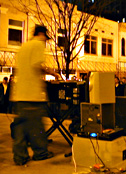
Comment
on this story
What:
Resurrection Tuesdays: Satoshi, Special K, Jest, Dj O.D.G., Jix, Mic 1, Bryce, Soda, plus weekly guests
When:
10 p.m. to 3 a.m., every Tuesday
Where:
Electric Ballroom, 1213 Western Ave.
Cost:
$3
|
|

DJ Satoshi concocts his own drum and bass blend
by Joe Tarr
Back in May, DJ Satoshi Okamoto took his turntables to a rave in Dayton, Ohio, to entertain the crowd with his unique brand of drum and bass turntablism.
He felt the rush of turning on an enthusiastic crowd.
"It was huge, and I played up on a stage. They had a couple of thousand people. That was probably biggest show I'd ever played," Satoshi says. "I was very surprised because the crowd was so much different from here. It's a very good scene [in Dayton]."
Although it was nice to get the adulation, it was a little frustrating when Satoshi compared Dayton's supportive crowd to the one in Knoxville. This city has few venues for electronic music. And the crowds are often sparse at the clubs that do feature it.
"I know there are many people listening to this kind of music in Knoxville, but they never come out to show support. The local scene is so small," Satoshi says. "I know there are people who dig music like me, but they don't show up. This city is just weird."
A native of Japan, Satoshi came to the United States when he was in high school, so he could learn English. He was drawn to electronic music and DJing after attending some rave parties.
"It was a party-going experience," he says of his introduction to the scene. "The sound was so loud, there were so many people enjoying the music and having a good time. I don't think people can get into this kind of music listening to it on their home stereos. It's the experience. Music in a big speaker sounds so different."
Learning the techniques of DJing was difficult. Electronic and hip hop DJs use mixers to blend and jump from turntable to turntable, and their genres have spawned a whole mess of intricate techniques that allow them to essentially improvise new sounds out of the records they play. For instance, they might take two records with the same tempo, match the beats and then flip back and forth between the records or play them at the same time. With beat juggling, the DJs jump back and forth between two records with different beats, for an edgy effect.
Of late, Satoshi favors playing drum and bass—essentially house music sped up to frenetic paces. But he's also done exceptionally well DJing behind hip hop MCs. He played at a couple of Market Square hip hop parties this year, including during the open mic part of the show. "Once I started getting into scratching, I started getting into hip hop," he says. "Scratching came from hip hop."
The techniques did not come easy.
"I guess I learned just by watching," Satoshi says in his North Knoxville home. "I used to go to parties and just stand in front of the DJ booth all night. No one really taught me. That was the hard part because there was no one really doing it."
"Many people think DJing is a popularity thing, trendy. Actually, it's dedication. People think DJs are popular, they get girls," he says, laughing and shaking his head no. The hours spent at home practicing his techniques didn't at the time promise much in the way of social rewards.
But they have paid off. Satoshi has proven deft at playing a number of different genres and garnered respect from various crowds. Arguably the best DJ in town, he recently won this year's Metro Pulse readers poll.
Despite his considerable talent, Satoshi is still miffed by the lack of enthusiasm for club music in Knoxville.
"The best part of DJing is when you're playing for a crowd and they're really digging it. Here, people will be sitting in a corner, and I can't tell if they enjoy it or not."
Even smaller cities like Johnson City have decent, enthusiastic scenes, he says. Part of the problem is that club owners are reluctant hosts. "Club owners don't like to take chances because they know they're not going to make money. They like top 40 music because it's popular."
But without anyone taking a chance on the music, it's hard to build a scene to support it.
Although he plays out of town, including Atlanta and Pittsburgh, Knoxville is not an ideal homebase: "People from outside this city don't care about a DJ from Knoxville, Tennessee. They make fun out of me," Satoshi says. "The rave scene, there's too much politics involved. It's not if you're good, they'll let you play. People have told me if I want to get big, I've got to move out of this city."
For now, he's tied to Knoxville because of college.
"I would like to make it. But to become a top DJ is like becoming a pop star. And there are so many people want to do it. It's harder than becoming a popular rock band," he says. "I just keep trying. But it's hard."

July 12, 2001 * Vol. 11, No. 28
© 2001 Metro Pulse
|





